by Chris Tharp
I blame it on Valium. I had popped one the night before to put me down, to guarantee a full night’s rest before a busy work week, and it performed with aplomb. I was lowered into the depths of a gelatinous envelope of sleep. This was a soothing black slumber, embracing me softly while massaging the hardened flesh of my inner brain. The Valium plied its magic with chemical tendrils that, while delivering on the sleep front, stubbornly fought release come morning time. That’s right, that magic little pill will knock you the hell out, but with that comes a price: your bones become leaden, your eyes balls of cotton, and your head a cloud of steam. A proper Valium hangover can drag on for hours and hours. It’s a tough thing to shake.
Even though I am now solidly trudging down the trail of middle age, I’m still not really a morning person. I don’t suppose I ever will be. I’ve gotten better, but it just seems, at a genetic level, that I’m designed to work best at night. So, that morning, Monday, March 17th, 2014–St. Patrick’s Day–I stumble out of bed near-blind from both my natural aversion to early hours and the fog of the pill. I have gotten my sleep, but am now positively zombified. Still, I have work to do. Carpe diem and all of that shit. My phone buzzes. It’s the station. Are you coming now? Yes, I clumsily type back. Coming now. I slide into my black Levis, throw on my green sweater and black jacket, grab my helmet and shoot out the door to do my weekly morning radio gig. I jump onto my motorcycle–a Hyosung Troy 125– turn the key and give the engine a couple of revs before zipping off to make my first fifty bucks of the day.
The station is located in Centum City–just a ten minute ride away in the sparse early-morning traffic. Centum is a spanky new part of town featuring glass and aluminum rises which jut from the bank of the Suyeong River. City PR pimps tried to christen it “The Manhattan of Busan,” to some eye-rolls and snickers among the Westerner set; such labeling may be a bit much, but that morning the place lives up to its hype: the sun sparkles off the surface of the river and lights up the side of the gleaming buildings, creating a brilliant scene. For a moment all seems right in the world
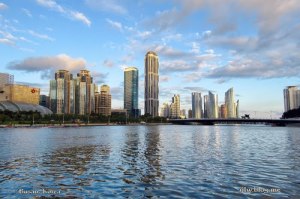
I arrive at the station at 7:10, ride the elevator to the 4th floor, scan my fingerprint, enter the studio, greet the producer and host, slither behind the mic and sleepwalk through the bit (a ten minute weekly sports round up). Afterwards I fly out the door, stumble down the stairs, and mount my bike once again to head back home where I plan to shower, eat, change into my work clothes, and most importantly, take down multiple cups of inky coffee to help blast me out of my haze. My first class is at 9 am at my school, again just a couple minutes’ ride from my front door.
I cruise through the nearly-empty streets of Centum, eager to get home as soon as I can. The air is still frigid from the night and slices through my coat, causing me to shiver beneath my sweater. This helps to keep me awake as I press on. I turn left onto a larger road that that spans the slow moving river as a bridge. To my right is the massive sewage treatment plant. The dank sweet smell of human waste mixed with soil radiates from the huge concrete fertilizer silo, on which is painted an unfinished marine-themed mural featuring the phantom silhouettes of fish. I then come to a much bigger intersection and stop. The light is red. Across the way I observe the slow lurch of a construction crane putting up an apartment block. It’s now around 7:40 and traffic is just beginning to pick up. It’s no longer a ghost town out here, but things are still empty enough. I sigh and fight the urge to close my heavy lids. I need to get home and caffeinate, now. The light is still red. I see a car blasting down the right lane. After him, I think. This is Korea, after all, where traffic lights are merely suggestions. I wait for the car to pass. I then figure the way is now clear, twist the throttle and go…

Honnnnnnnnnnnnk!
It’s coming from the left. My left side. The direction where somehow, inexplicably, I had neglected to look. The scream of braking rubber on asphalt. Oh shit. My veins turn to ice. My stomach opens into sick black pit as I realize that I have just pulled out directly into the path of a speeding car.
CRACK!
I come to on the ground. It’s rough and ice cold. I feel cars whizzing by. A man stands over me bellowing in Korean: “Are you okay? Why didn’t you see me? Why didn’t you look???” My shoulder is on fire. My left leg screams. I try to move. Agony. Nausea.
“Don’t! Stay still!”
I look down and see that my left leg, about halfway down below the knee, is sticking out at a 90 degree angle. The jagged end of the shin bone sticks out through black denim. There is blood. “My leg… my leg,” I manage in Korean. A siren in the distance. Then I pass out.

There are now several men around me. Uniforms. They crouch down and take hold: “One, two, three.” A supernova of pain explodes up my leg while I’m shifted onto a stretcher. I lift into the air and am loaded in the back of the ambulance. The door slams shut and the paramedic speaks to me in English: “You are going to be okay.” Decent English. The vehicle engages into gear and we’re off, siren crying outside. “This will help with the pain.” A pinprick as he finds a vein. Again, I pass out.
I come to in the hospital. I’m on a gurney. I see white walls, the lurid lights of the E.R. I’m afraid to look at my leg because I’m sure it looks like I stepped on a land mine. The pain has largely vanished, though. Hooray for drugs! There are three doctors milling about, consulting. One of them hands me my phone and tells me to call someone close. I try Minhee. She doesn’t pick up. It’s early. Still asleep. I hand it back to the doctor, so smart in his lab coat. He looks like a kid. I’m surely his hyung. In a restaurant he’d be pouring my drinks. He starts working down the list of people on my call log. I begin to fade out until he hands me the phone once again.
“Hello, Chris? What’s happening?” It’s my co-worker Cheryl.
A while later the doctors wheel me into another room under brighter lights. “We will now set your fracture,” the young one says in well-pronounced English. “You will feel…” he searches for the word, “…intense pain.”
Just then my boss, Professor Park, appears. She’s a tall, refugee-skinny woman of about sixty. She greets the doctors with an “Annyeonghaseo?” followed by a tiny bow. They return the greeting and and have a short exchange. She takes one look at my leg and the color drains from her face. “Uh, Chris… you’re classes are covered… it is okay. Don’t worry. No problem.”
She looks again to the carnage.
“Fighting!” she says for encouragement, making a bony fist to emphasize the point. She smiles a nervous smile then disappears. The doctors grab my leg. I can feel the bones freely floating as they begin to wrestle with it in an attempt at a set. I scream through the veil of painkiller coursing through my veins until the manhandling stops. They apply a splint and wheel me back out to the E.R., and inform me that I’ll require surgery right away.
In the meantime I’m wheeled into several other rooms for X-rays and a scan to make sure my head is okay. Thankfully my helmet did its job and everything is fine upstairs. Also, there is no neck/spinal injury. It seems my mangled leg is the worst of it, which at this point doesn’t seem so bad, since I now know that, even though I have a long road to recovery, I’ll be okay. A warm wave of relief mixes with the drugs as I am wheeled back into the E.R.
As I sit in the E.R., afloat on the gurney, Minhee finally arrives, rushing in in a panic. She is crying. She tells me that her battery was dead and she missed the flood of phone calls that deluged her device for three hours after the wreck. She describes her exchange with my boss, Professor Park, how when she finally reached her, Professor Park (a constantly proselytizing born-again Christian) only told Minhee that she “must pray.”
“But how is he?” Minhee pleaded. “Will he be okay?”
“Do you know how to pray?” Professor Park continued, oblivious to Minhee’s desperate query. “I will teach to you pray.” Unable to get a straight answer out of the woman, Minhee hung up the phone and jumped a taxi, fearing the worst.
When she finally kisses me I am on my phone, letting the Facebook universe know what has happened, that I’ve suffered a motorcycle wreck and broken my leg, but that I’ve avoided the worst and will likely come out largely unscathed in the end.
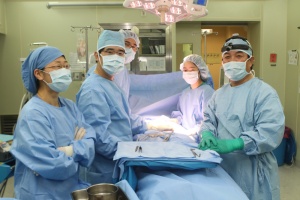
In the late afternoon I’m taken into surgery. They inject me with a spinal anaesthetic which not only numbs, but paralyzes the bottom half of my body. I can’t move a thing. Freaky. They then give me something to put me out, which doesn’t entirely do the job. I keep coming to, listening to them bang and clang around my leg. It sounds like a construction zone. I notice that throughout the procedure several doctors and nurses repeatedly check their smart phones. Even they’re addicted to the things. I hope it’s just Kakao and Facebook. Part of me dreads that the main surgeon is getting his instructions from the Korean version of Wikipedia.
The surgery goes by without any hitches, and I come out the proud owner of a metal rod and pins holding together my fractured tibia. The fibula, which was also broken, is a bone which bears no weight, and will be left alone. This, evidently, is very common among orthopedic surgeries these days. I choose to take the doctor’s word on it.
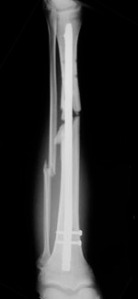
I spend the next two nights in a group room: Five patients stuffed into a small space. But it’s not just five people: In Korea, you are expected to bring your own caretaker. The nurses change your IV’s and take your blood pressure, but the nuts and bolts of looking after someone–emptying your pee pitcher, getting you water, basic cleaning, assisting with eating–this all rests on the shoulders of your personal caregiver, which, in most cases, is a family member. Each big bed has a mini-bed that rolls underneath it for storage, so five people in the room becomes ten. Add the fact that several of the “patients” don’t seem to be really hurt at all (staying in the hospital for insurance claims, I’m told), and all day the room becomes a coffee-klatch for middle aged Korean ajummas and ajeoshis to sit and yap at crazy volumes. I’m in severe pain with a painkiller that isn’t even coming CLOSE to dealing with the discomfort I got going on, and all I can do between bouts of moaning is to fantasize about defenestrating my roommates from the 9th story window.
The next day Minhee has me moved into a private room, where I am given peace and quiet, along with a big bag of self-dosing fentanyl that finally allows me to recoup with a modicum of serenity. I stay in that hospital for a week and a half before transferring to a cheaper and more convenient location, where I pass the remainder of my stay. My Facebook and email is abuzz with messages from both Korea and around the world. A steady stream of friends and well-wishers visits me daily. At times my room resembles a small party. I’m presented with plates of food, envelopes of cash to help offset the expense and books. Books are delivered en mass and I chew through them, particularly charmed by an account of Shackleton’s Antarctic expedition and the hilarious/bleak graphic novels of Daniel Clowes. I am well rested, happy, and above all, thankful. I feel calmer and more positive than I have in years. I’m released on the 18th day and start back at work the following Monday.

Today is the one year anniversary of that nasty wreck, that day where, if the dice would have come up a bit differently, I may not even be here typing today. The whole time I was laid up I kept telling myself: It could be worse. And it could have. I could have ended up dead or eating jello for a living. I got fucked up. I got hurt but bounced back quickly, and trip around the sun later I’m back in action. My leg is 95% there. I walk miles daily and hike several times a week. When hobbling around last spring, unable to partake of any of the physical joys that we associate with warming weather, I promised myself that once my leg was healed I was use it with a vengeance, that I would make walking even more of a priority in my life and so far I have delivered on that. This summer I’ll go on a massive hike either here in Asia or that States (haven’t decided yet), and I’m planning to do an epic jaunt here in Korea in the future, one that could take me up the entire spine of the country on foot.
My motorcycle was destroyed in the wreck and sold off for parts to a garage. I haven’t been on a bike since, though I haven’t forsworn riding again in the future. I rode for nearly ten years without a serious incident, and may have hit eleven had I been a bit more awake that morning. But I wasn’t. I wasn’t thinking. I had gotten absolutely placid on a route that I had ridden a hundred times before, and it nearly cost me my life. I broke the first rule of crossing the road, taught to us all by our mothers when we’re just beginning to totter along on our feet:
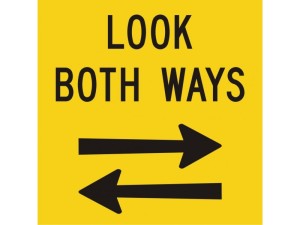
I believe I will ride again, but only for open-road travel. I won’t ride a motorcycle for my daily transportation in a city such as Busan where so many people drive like crackheads. Sure, this crash was my fault, but next time it may be someone else asleep at the wheel, and they may not even brake.
Of course it was my wife Minhee who really carried the weight while I was hurt. She dealt with the doctors, the insurance, the police, our home, our animals, the bills, my work, and most importantly, me. At one point she literally wiped my butt. This actually happened, and no, I’m not proud. She was hoping to avoid such a chore until well into our elderly years, but we don’t always get to choose the whens and where’s, now do we? I am thankful to have married such a terrific woman. It took getting maimed to really appreciate tying the knot. In sickness and in health…
Korea proved its mettle, at least as far as its health system goes. I was delivered to a state-of-the-art hospital within thirty minutes of my wreck and patched up by doctors who knew what the hell they were doing, even if they felt the need to chat on their phones in the operating room. Sure, they do a few things different than the west, but in the end I was taken care of and not left with staggering debt, even given the fact that the national insurance made me reimburse them since the crash was my fault. This was something that I was ignorant of going in: Korean national health insurance doesn’t cover some things deemed too risky or negligent on behalf of the claimant. They’ll pay the bill but come to collect it later. Luckily, my friends in Busan passed the hat and raised a lot of money to help take the sting out of that, but all said and done a full surgery and two and a half week stay in a private hospital room clocked in less than eight thousand dollars. Add another zero to those digits and we just may be approaching the bill in America, sans insurance.

So here I am, scarred but alive. I’m not able to sprint yet and my shoulder is a bit sore at times, but I can’t complain. As I lay there in that hospital bed with my leg jacked up, I often thought, I wonder how I’ll feel in a year’s time? Well today I got the answer: pretty damned good, and if you want to know, I’ve now switched to Xanax. It’s much easier on the system the next day.
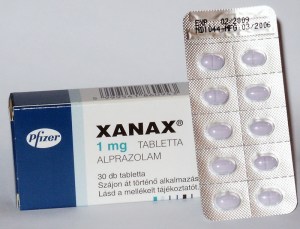
 into the Roman alphabet. All of them were more or less interchangeable in what they offered, and they sat pretty much right on top of another. I often wondered how they stayed in business.
into the Roman alphabet. All of them were more or less interchangeable in what they offered, and they sat pretty much right on top of another. I often wondered how they stayed in business. I got a chuckle out of this short video by NPR reporter Elise Hu, who recently visited a few of Seoul’s animal cafes. As Hu notes, animal cafes have been popping up in many Asian cities, and are often popular because they provide a way for people who can’t have pets to get their regular fix of animal interaction. While she quickly takes a shine to the dog cafe, the raccoon cafe is another story.
I got a chuckle out of this short video by NPR reporter Elise Hu, who recently visited a few of Seoul’s animal cafes. As Hu notes, animal cafes have been popping up in many Asian cities, and are often popular because they provide a way for people who can’t have pets to get their regular fix of animal interaction. While she quickly takes a shine to the dog cafe, the raccoon cafe is another story.



 Koreans are one of the most-sleep deprived groups of people in the world, clocking fewer hours of sleep than any other OECD country. Because of this, it’s still common to see commuters dozing on trains and buses, students nodding at their desks, and office workers consuming much more caffeine than was the case even a few years ago.
Koreans are one of the most-sleep deprived groups of people in the world, clocking fewer hours of sleep than any other OECD country. Because of this, it’s still common to see commuters dozing on trains and buses, students nodding at their desks, and office workers consuming much more caffeine than was the case even a few years ago.














